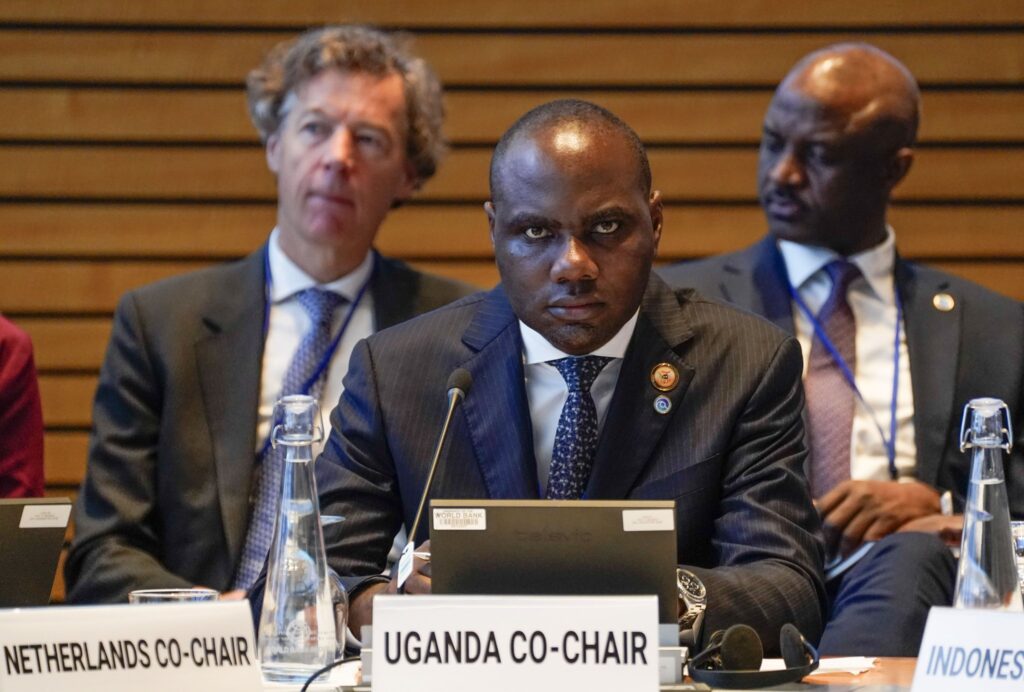
We believe adaptation efforts are not just necessary for resilience but are also key to unlocking economic opportunities
Uganda’s ascent to co-chairmanship of the Coalition of Finance Ministers for Climate Action marks a significant milestone in its evolving role within the global climate finance architecture.
This appointment, formalized during the 2025 Spring Meetings of the World Bank Group and the International Monetary Fund (IMF) in Washington D.C., is not merely a symbolic gesture of recognition. Rather, it is a testament to Uganda’s proactive and increasingly sophisticated approach to harmonizing economic growth imperatives with the exigencies of environmental sustainability.
Uganda will share the co-chairmanship responsibilities with the Netherlands. The official handover took place with Uganda’s Minister of State for General Duties, Hon Henry Musasizi, accepting the position on behalf of the Government of Uganda from the outgoing co-chair, H.E. Sri Mulyani Indrawati, the Finance Minister of Indonesia.
“We deeply appreciate the trust placed in us and we are committed to advancing our shared climate and economic goals,” stated Minister Hon Henry Musasizi, acknowledging the importance of this new responsibility.
Minister Musasizi, accompanied by Permanent Secretary/Secretary to the Treasury (PSST) Ramadan Ggoobi and other technical staff, outlined Uganda’s vision for integrating climate action into core financial management. He stressed the need for Finance Ministers worldwide to incorporate climate goals into fiscal policy, budgeting processes, national planning frameworks, and debt management strategies, alongside the mobilization of both public and private financial resources.
At the heart of Uganda’s climate strategy lies a fundamental paradigm shift toward climate-responsive financial management. This entails a systemic and integrated approach wherein climate change considerations are no longer treated as peripheral but are embedded within the core tenets of economic governance.
Specifically, climate goals are now rigorously integrated into key financial processes by informing the allocation of public resources through climate risk assessments and the financing of mitigation and adaptation, evaluating public investments like infrastructure for environmental sustainability and climate resilience alongside economic returns, and recalibrating long-term national planning to align with climate change projections and ensure environmentally sustainable economic growth trajectories.
This holistic approach to climate-responsive financial management is not merely an exercise in compliance with international norms. It is a strategic imperative that underpins Uganda’s broader development priorities. By integrating climate resilience into economic planning, Uganda seeks to safeguard its progress against the adverse impacts of climate change, thereby ensuring the long-term sustainability of its economic development. Furthermore, this approach is instrumental in building resilience within key economic sectors that are particularly vulnerable to climate-related shocks, most notably agriculture and energy.
A defining characteristic of Uganda’s approach is its pronounced emphasis on climate adaptation. This focus is particularly salient given Uganda’s socio-economic context, where climate change impacts have a direct and profound effect on the livelihoods of a significant proportion of the population, with the agricultural sector being especially susceptible. However, Uganda’s perspective on climate adaptation transcends a purely defensive posture. The nation views adaptation not simply as a matter of survival or risk mitigation, but rather as a strategic opportunity to unlock new avenues for economic growth and diversification.
This forward-looking perspective was articulated with clarity and conviction by Minister Henry Musasizi during the 2025 Spring Meetings. Minister Musasizi stated unequivocally, “We believe adaptation efforts are not just necessary for resilience but are also key to unlocking economic opportunities.” This statement encapsulates Uganda’s proactive approach to adaptation, wherein investments in climate-resilient agriculture, water management, and infrastructure are seen as drivers of job creation, innovation, and overall economic advancement.
Uganda is also demonstrating tangible leadership in the critical area of climate finance mobilization. Recognizing that substantial financial resources are indispensable for effective climate action, Uganda is actively pursuing innovative mechanisms to mobilize both public and private capital.
Uganda employs several key mechanisms to mobilize climate finance: green budget tagging to track and categorize climate-related expenditures, blended finance models to leverage public, concessional, and private capital for sustainable development, and strategic partnerships with international institutions such as the IMF and the World Bank to access expertise and resources.
Through these concerted efforts, Uganda is not only advocating for climate action on the global stage but also demonstrating, in practical terms, what climate-smart governance can and should look like in emerging economies. The country’s experience offers valuable lessons and replicable models for other nations grappling with the intertwined challenges of climate change and sustainable development.
In its role as a co-chair of the Coalition of Finance Ministers for Climate Action, Uganda assumes a position of significant influence and responsibility. The nation is poised to shape the global discourse on climate finance, advocate for the interests of the Global South, and share its practical insights on how climate action and economic development can be effectively integrated to achieve a more sustainable and equitable future.
Uganda’s approach, characterized by its emphasis on adaptation as an economic opportunity and its commitment to innovative financing mechanisms, positions it as a compelling and influential model worthy of close attention on the international stage.
